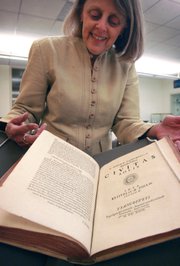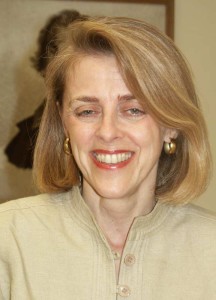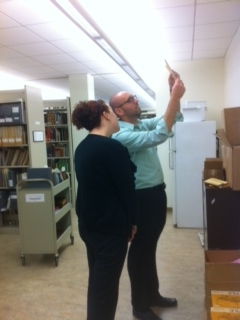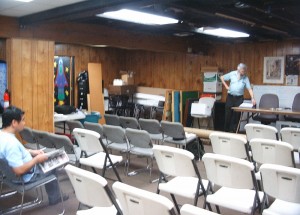Melissa Conway, the director of the world’s largest collection of science fiction and fantasy, announced her retirement on January 3, 2015. Conway has been at the University of California Riverside for thirteen years, arriving as Head of Special Collections in May 2001. Conway followed her husband to the west coast, having previously worked at the Library of Congress, the Folger Shakespeare Library, Yale’s Beinecke Library, and a private art collection in Washington, DC.
Conway, a specialist in medieval and Renaissance manuscripts with a Ph.D. in Medieval Studies from Yale University, had no scholarly background in science fiction when she came to UCR. “George Slusser was the Eaton Curator when I arrived, so I didn’t have to worry about promoting the Eaton,” explained Conway. But when Slusser retired shortly after she arrived and UCR decided to hire a University Archivist instead of another science fiction specialist, Conway realized she had to learn about science fiction—and quickly! “I didn’t want to be responsible for the decline of the world’s largest science fiction research collection!” she says. Conway took her role seriously, and was particularly pleased when the Eaton was assessed in an independent study as the leading science fiction research collection among Association of Research Libraries in 2006.

Melissa Conway, head of Special Collections & University Archives at UCR, displays a rare first edition of Utopian writer Tommaso Campanella’s “Civitas Solis” (City of the Sun), written in Latin in 1623.
Highlights among Conway’s accomplishments include reviving, in 2008, the Eaton Science Fiction Conference after a nine-year hiatus, making it not only financially self-sustaining but also profitable; establishing the Eaton Lifetime Achievement Award in Science Fiction, honoring SF masters Ray Bradbury (2008), Frederik Pohl (2009), Samuel R. Delany (2010) Harlan Ellison (2011), Ursula K. Le Guin (2012), Ray Harryhausen and Stan Lee (2013); increasing the holdings of Eaton by 40%, largely through donations and grant funding; raising more than $5 million dollars in gifts-in-kind and cash donations, including the 1517 Paris edition of Thomas More’s Utopia, the science fiction fanzine collection of Bruce Pelz, the anime and “furry” collections of Fred Patten; the 1623 edition of Tommaso Campanella’s Civitas Solis; the Jane and Howard Frank Collection of the papers of Edwardian horror writer William Hope Hodgson; the papers of Anne McCaffrey; and the photographic archive—and $3.5 million cash endowment—of Jay Kay Klein, the largest cash gift to the UCR Library in its sixty year history.
Conway even found ways to combine her background in medieval studies with science fiction, including having been chosen in 2009 to participate in a National Endowment for the Humanities Seminar in Florence, Italy on Dante and The Divine Comedy, for her project on Dante’s influence on more than fifty works of SF.
Conway wishes to acknowledge the steadfast support and essential contributions of her colleagues at UCR in the success of the Eaton, in particular Professors Rob Latham, Sherryl Vint, and Nalo Hopkinson; Julia Ree, Eaton Subject Selector; Sarah Allison, former Reading Room Coordinator in Special Collections; Dean Stephen Cullenberg, who established the Science Fiction and Technoculture Studies Program in the College of Humanities, Arts, and Social Sciences; former University Librarian Ruth Jackson, who was a steadfast supporter of the Eaton; and the late George Slusser, who fought the good fight for twenty-five years when the Eaton Collection—and science fiction as an academic discipline—were under attack from various quarters. “Without each of them,” Conway notes, “none of these advances would have been possible.”
Conway’s brilliance and diligence as a curator and conference organizer, as well as her graciousness and good humor as a colleague, have earned her the respect and affection of the UCR faculty who have worked with her. Professor of English Rob Latham, co-director of the Science Fiction and Technoculture Studies Program, who has helped to mount two Eaton Conferences alongside Conway, says that “UCR library—and the entire SF community—simply will not be the same without her. She has been an unparalleled champion of archival research in the field, as well as a wonderful collaborator and a very good friend. Her departure is a terrible loss for all of us who love science fiction.”
“Melissa Conway was an ideal colleague: knowledgeable, dedicated and seemingly tireless in her advocacy of the Eaton collection,” says Professor of English Sherryl Vint, who co-directs the SFTS program with Latham. “She is responsible not only for sustaining this world-class collection but also for creating a vibrant and welcoming intellectual community around it. She will be dearly missed and her absence will be a loss felt across the field.”
In the words of Nalo Hopkinson, award-winning SF author and Professor of Creative Writing at UCR: “Dr. Conway’s work championing and increasing the scope of the Eaton Archive built brilliantly on Dr. Slusser’s legacy. She possessed a visionary approach to collection development and fundraising. The results speak for themselves. Under Dr. Conway’s leadership, she and her staff created an unparalleled dynamic of trust, collegiality, and cooperation with faculty in UCR’s science fiction research cluster and with the science fiction community in general. A golden era has ended.”
[From the press release.]





